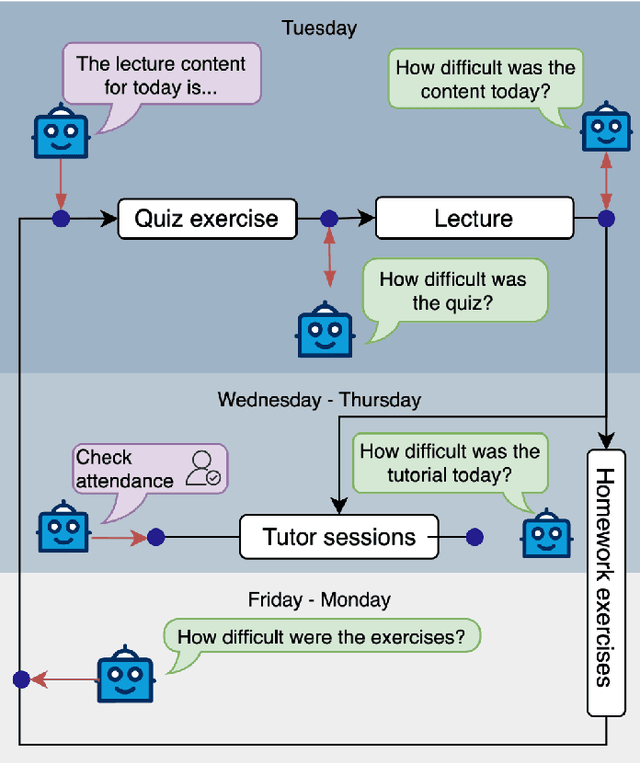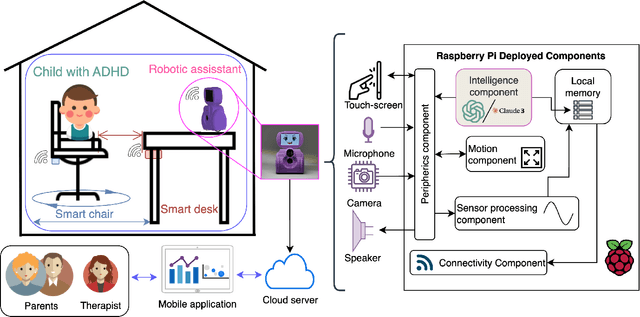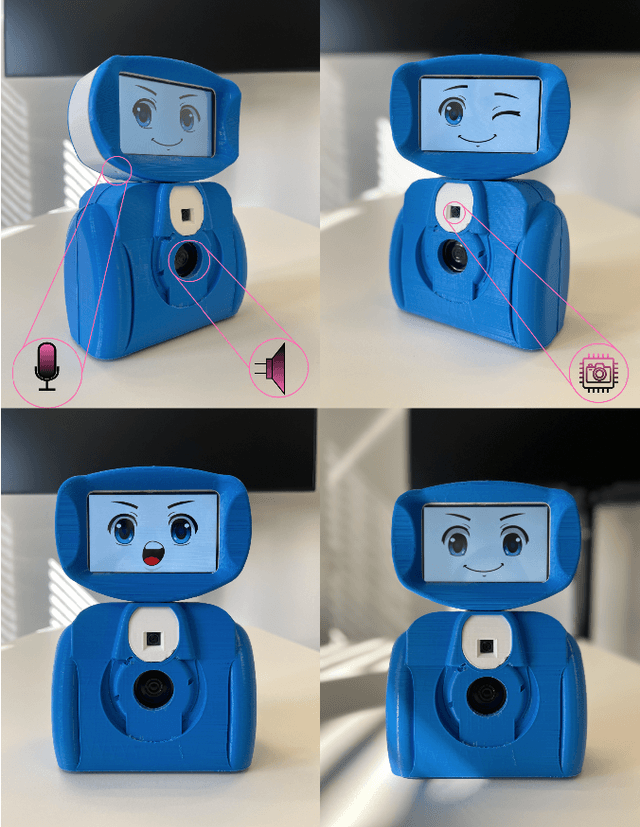Santiago Berrezueta-Guzman
iTrace: Click-Based Gaze Visualization on the Apple Vision Pro
Aug 17, 2025Abstract:The Apple Vision Pro is equipped with accurate eye-tracking capabilities, yet the privacy restrictions on the device prevent direct access to continuous user gaze data. This study introduces iTrace, a novel application that overcomes these limitations through click-based gaze extraction techniques, including manual methods like a pinch gesture, and automatic approaches utilizing dwell control or a gaming controller. We developed a system with a client-server architecture that captures the gaze coordinates and transforms them into dynamic heatmaps for video and spatial eye tracking. The system can generate individual and averaged heatmaps, enabling analysis of personal and collective attention patterns. To demonstrate its effectiveness and evaluate the usability and performance, a study was conducted with two groups of 10 participants, each testing different clicking methods. The 8BitDo controller achieved higher average data collection rates at 14.22 clicks/s compared to 0.45 clicks/s with dwell control, enabling significantly denser heatmap visualizations. The resulting heatmaps reveal distinct attention patterns, including concentrated focus in lecture videos and broader scanning during problem-solving tasks. By allowing dynamic attention visualization while maintaining a high gaze precision of 91 %, iTrace demonstrates strong potential for a wide range of applications in educational content engagement, environmental design evaluation, marketing analysis, and clinical cognitive assessment. Despite the current gaze data restrictions on the Apple Vision Pro, we encourage developers to use iTrace only in research settings.
How LLMs are Shaping the Future of Virtual Reality
Aug 01, 2025Abstract:The integration of Large Language Models (LLMs) into Virtual Reality (VR) games marks a paradigm shift in the design of immersive, adaptive, and intelligent digital experiences. This paper presents a comprehensive review of recent research at the intersection of LLMs and VR, examining how these models are transforming narrative generation, non-player character (NPC) interactions, accessibility, personalization, and game mastering. Drawing from an analysis of 62 peer reviewed studies published between 2018 and 2025, we identify key application domains ranging from emotionally intelligent NPCs and procedurally generated storytelling to AI-driven adaptive systems and inclusive gameplay interfaces. We also address the major challenges facing this convergence, including real-time performance constraints, memory limitations, ethical risks, and scalability barriers. Our findings highlight that while LLMs significantly enhance realism, creativity, and user engagement in VR environments, their effective deployment requires robust design strategies that integrate multimodal interaction, hybrid AI architectures, and ethical safeguards. The paper concludes by outlining future research directions in multimodal AI, affective computing, reinforcement learning, and open-source development, aiming to guide the responsible advancement of intelligent and inclusive VR systems.
From Coders to Critics: Empowering Students through Peer Assessment in the Age of AI Copilots
May 28, 2025Abstract:The rapid adoption of AI powered coding assistants like ChatGPT and other coding copilots is transforming programming education, raising questions about assessment practices, academic integrity, and skill development. As educators seek alternatives to traditional grading methods susceptible to AI enabled plagiarism, structured peer assessment could be a promising strategy. This paper presents an empirical study of a rubric based, anonymized peer review process implemented in a large introductory programming course. Students evaluated each other's final projects (2D game), and their assessments were compared to instructor grades using correlation, mean absolute error, and root mean square error (RMSE). Additionally, reflective surveys from 47 teams captured student perceptions of fairness, grading behavior, and preferences regarding grade aggregation. Results show that peer review can approximate instructor evaluation with moderate accuracy and foster student engagement, evaluative thinking, and interest in providing good feedback to their peers. We discuss these findings for designing scalable, trustworthy peer assessment systems to face the age of AI assisted coding.
Supporting Preschool Emotional Development with AI-Powered Robots
May 24, 2025Abstract:This study evaluates the integration of AI-powered robots in early childhood education, focusing on their impact on emotional self-regulation, engagement, and collaborative skills. A ten-week experimental design involving two groups of children assessed the robot's effectiveness through progress assessments, parental surveys, and teacher feedback. Results demonstrated that early exposure to the robot significantly enhanced emotional recognition, while sustained interaction further improved collaborative and social engagement. Parental and teacher feedback highlighted high acceptance levels, emphasizing the robot's ease of integration and positive influence on classroom dynamics. This research underscores the transformative potential of AI and robotics in education. The findings advocate for the broader adoption of AI-powered interventions, carefully examining equitable access, ethical considerations, and sustainable implementation. This work sets a foundation for exploring long-term impacts and expanding applications of AI in inclusive and impactful educational settings.
Interactive Learning in Computer Science Education Supported by a Discord Chatbot
Jul 27, 2024



Abstract:Enhancing interaction and feedback collection in a first-semester computer science course poses a significant challenge due to students' diverse needs and engagement levels. To address this issue, we created and integrated a command-based chatbot on the course communication server on Discord. The DiscordBot enables students to provide feedback on course activities through short surveys, such as exercises, quizzes, and lectures, facilitating stress-free communication with instructors. It also supports attendance tracking and introduces lectures before they start. The research demonstrates the effectiveness of the DiscordBot as a communication tool. The ongoing feedback allowed course instructors to dynamically adjust and improve the difficulty level of upcoming activities and promote discussion in subsequent tutor sessions. The data collected reveal that students can accurately perceive the activities' difficulty and expected results, providing insights not possible through traditional end-of-semester surveys. Students reported that interaction with the DiscordBot was easy and expressed a desire to continue using it in future semesters. This responsive approach ensures the course meets the evolving needs of students, thereby enhancing their overall learning experience.
Exploring the Efficacy of Robotic Assistants with ChatGPT and Claude in Enhancing ADHD Therapy: Innovating Treatment Paradigms
Jun 21, 2024



Abstract:Attention Deficit Hyperactivity Disorder (ADHD) is a neurodevelopmental condition characterized by inattention, hyperactivity, and impulsivity, which can significantly impact an individual's daily functioning and quality of life. Occupational therapy plays a crucial role in managing ADHD by fostering the development of skills needed for daily living and enhancing an individual's ability to participate fully in school, home, and social situations. Recent studies highlight the potential of integrating Large Language Models (LLMs) like ChatGPT and Socially Assistive Robots (SAR) to improve psychological treatments. This integration aims to overcome existing limitations in mental health therapy by providing tailored support and adapting to the unique needs of this sensitive group. However, there remains a significant gap in research exploring the combined use of these advanced technologies in ADHD therapy, suggesting an opportunity for novel therapeutic approaches. Thus, we integrated two advanced language models, ChatGPT-4 Turbo and Claude-3 Opus, into a robotic assistant to explore how well each model performs in robot-assisted interactions. Additionally, we have compared their performance in a simulated therapy scenario to gauge their effectiveness against a clinically validated customized model. The results of this study show that ChatGPT-4 Turbo excelled in performance and responsiveness, making it suitable for time-sensitive applications. Claude-3 Opus, on the other hand, showed strengths in understanding, coherence, and ethical considerations, prioritizing safe and engaging interactions. Both models demonstrated innovation and adaptability, but ChatGPT-4 Turbo offered greater ease of integration and broader language support. The selection between them hinges on the specific demands of ADHD therapy.
 Add to Chrome
Add to Chrome Add to Firefox
Add to Firefox Add to Edge
Add to Edge